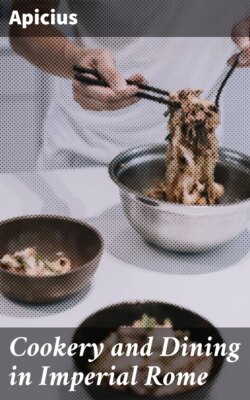Читать книгу Cookery and Dining in Imperial Rome - Apicius - Страница 28
На сайте Литреса книга снята с продажи.
The Excerpts of Vinidarius
ОглавлениеTable of Contents
And now, from a source totally different than the two important manuscripts so much discussed here, we receive additional proof of the authenticity of Apicius. In the codex Salmasianus (cf. III, Apiciana) we find some thirty formulæ attributed to Apicius, entitled: Apici excerpta a Vinidario vir. inl. They have been accepted as genuine by Salmasius and other early scholars. Schuch incorporated the excerpta with his Apicius, placing the formulæ in what he believed to be the proper order. This course, for obvious reasons, is not to be recommended. To be sure, the excerpta are Apician enough in character, though only a few correspond to, or are actual duplicates of, the Apician precepts. They are additions to the stock of authentic Apician recipes. As such, they may not be included but be appended to the traditional text. The excerpta encourage the belief that at the time of Vinidarius (got. Vinithaharjis) about the fifth century there must have been in circulation an Apicius (collection of recipes) much more complete than the one handed down to us through Fulda. It is furthermore interesting to note that the excerpta, too, are silent about Cœlius.
We may safely join Vollmer in his belief that M. Gabius Apicius, celebrated gourmet living during the reign of Tiberius was the real author, or collector, or sponsor of this collection of recipes, or at least of the major part thereof—the formulæ bearing the names of posterior gourmets having been added from time to time. This theory also applies to the two instances where the name of Varro is mentioned in connection with the preparation of beets and onions (bulbs). It is hardly possible that the author of the book made these references to Varro. It is more probable that some well-versed posterior reader, perusing the said articles, added to his copy: “And Varro prepared beets this way, and onions that way. …” (cf. Book III, [70]) Still, there is no certainty in this theory either. There were many persons by the names of Commodus, Trajanus, Frontinianus, such as are appearing in our text, who were contemporaries of Apicius.
With our mind at ease as regards the genuineness of our book we now may view it at a closer range.
